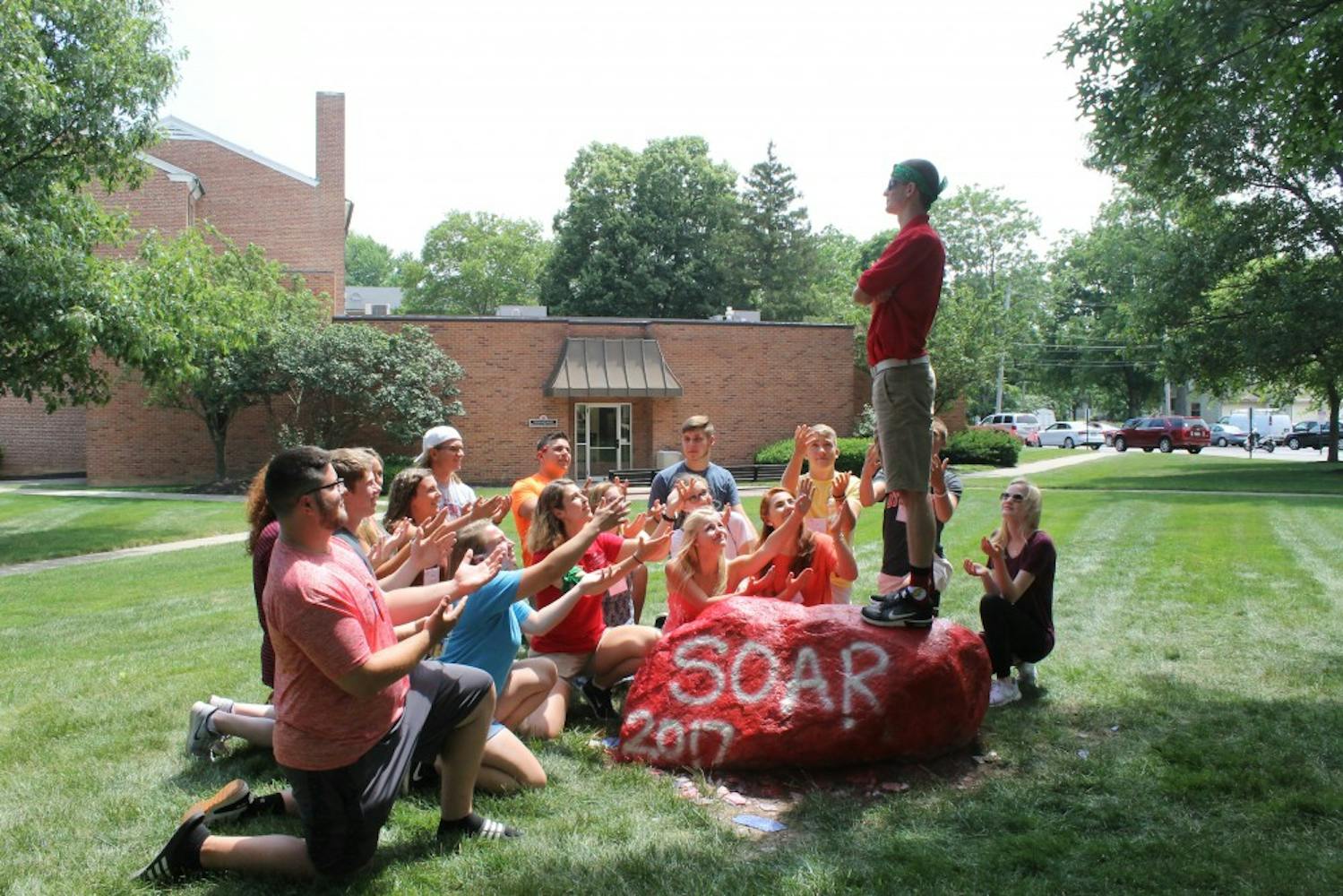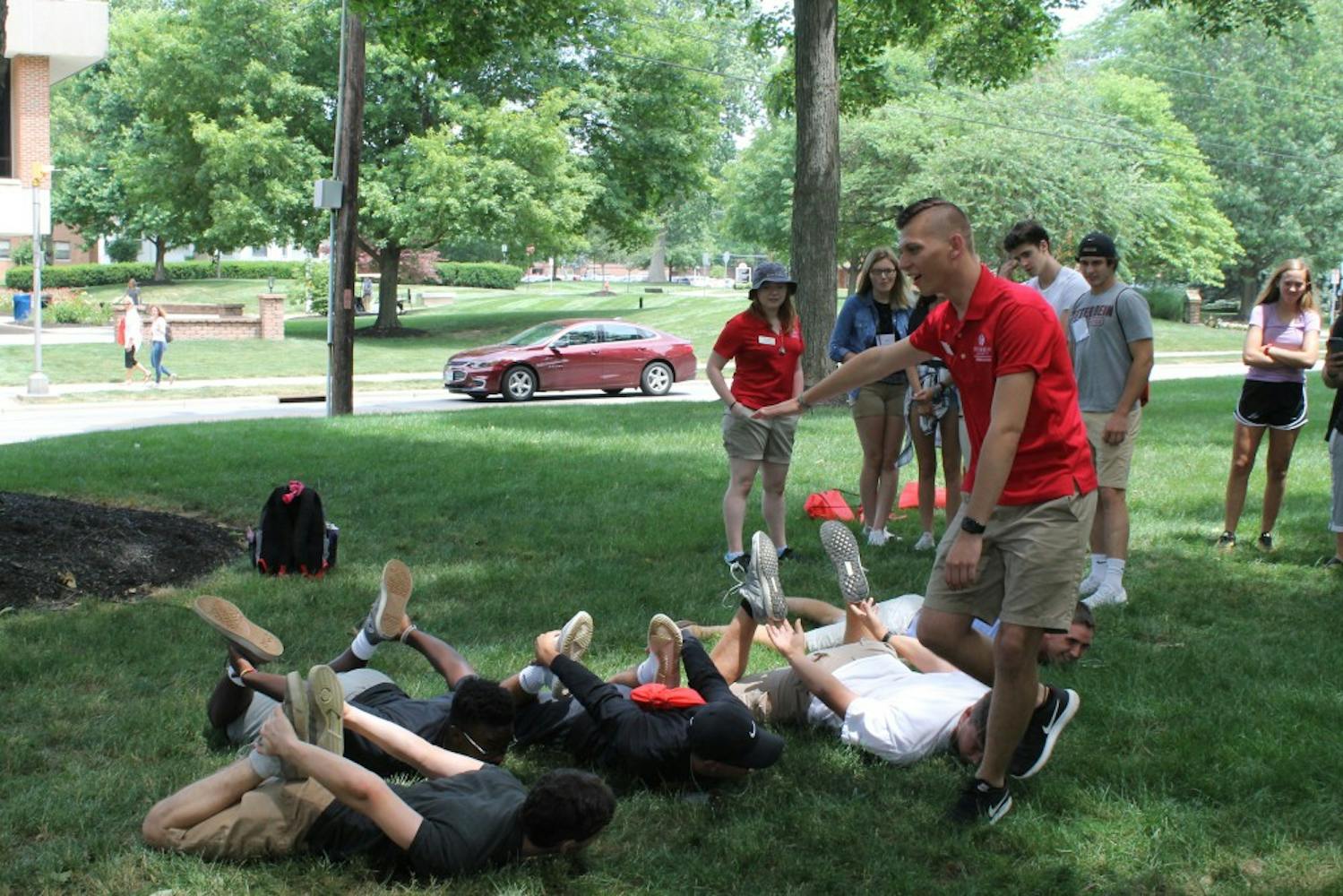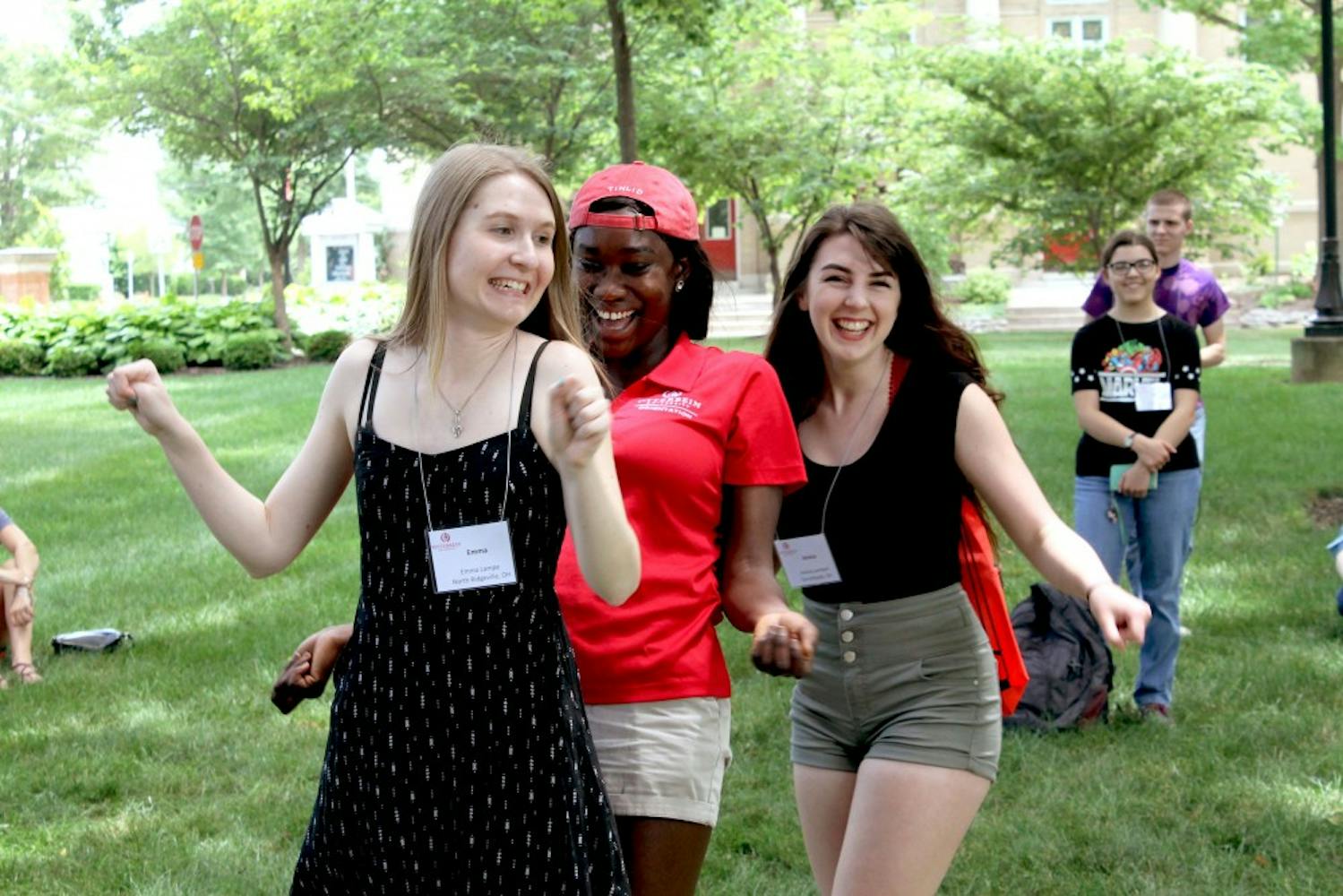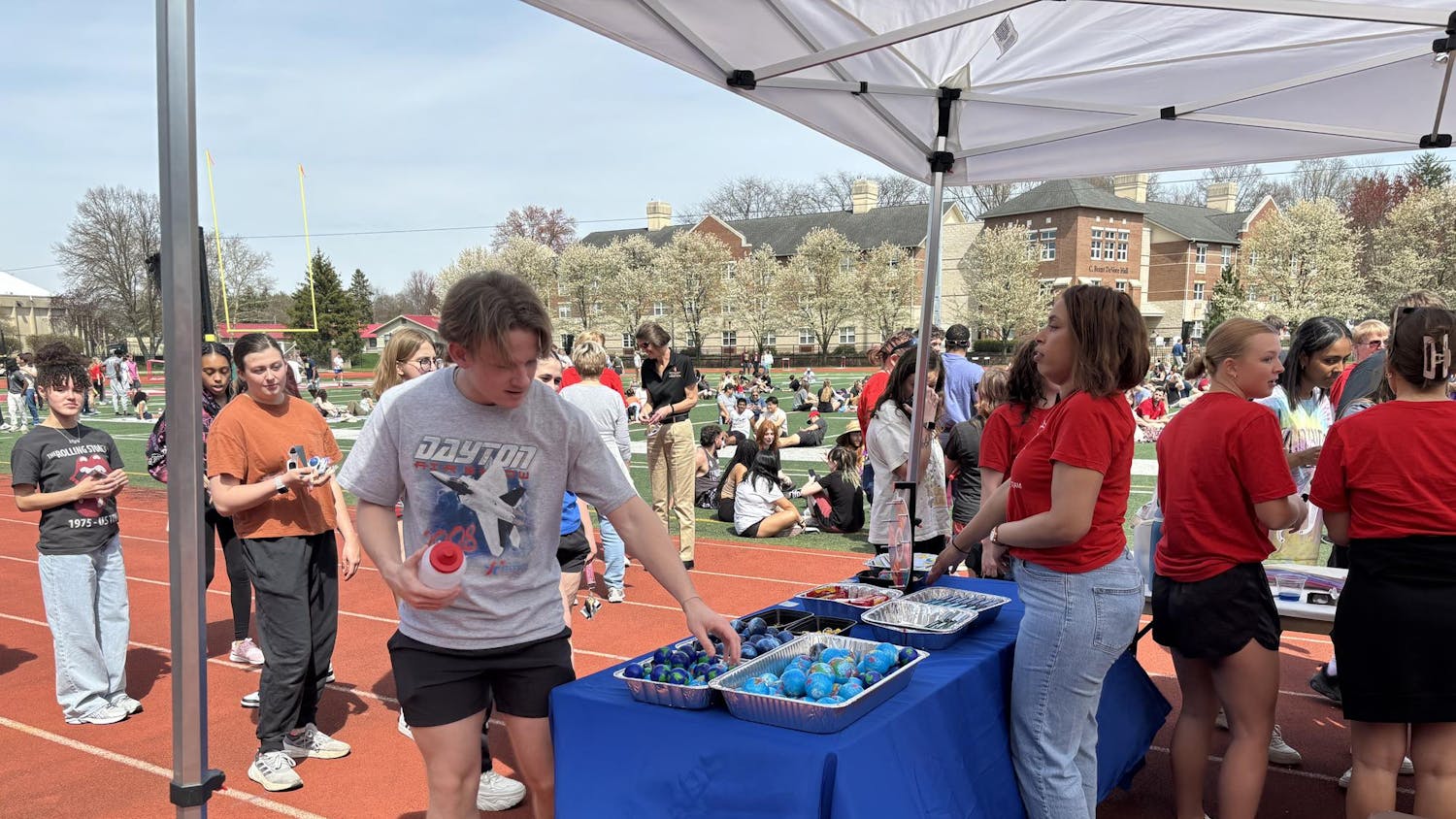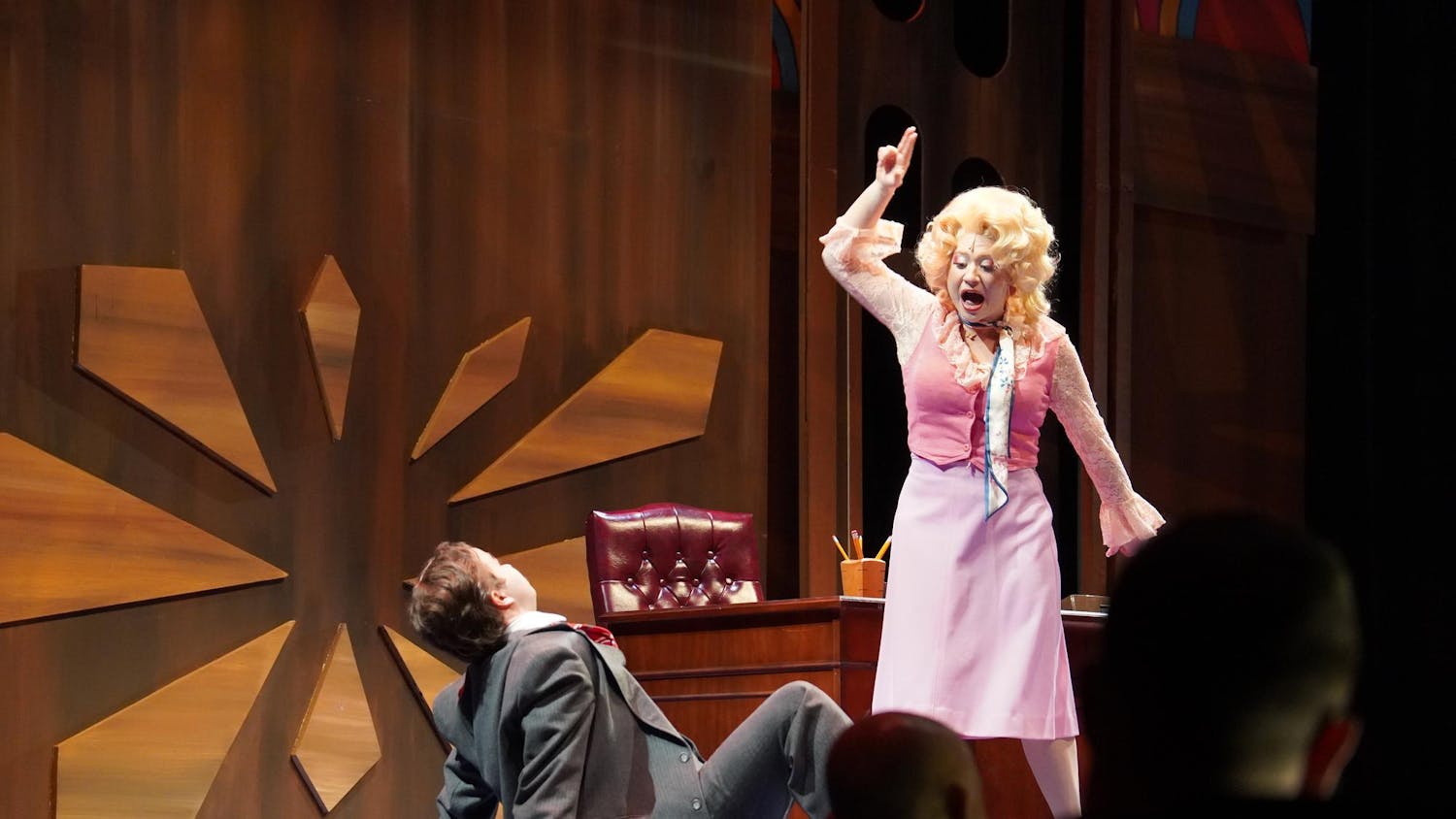Abby Shump sits with her fellow first-year students crowding inside Cowan Hall as the festivities of one of Otterbein’s summer orientation days begin. Lights are shining on an empty stage and background music is being played, though no one is listening. Nervous chatter talks over the music and echoes throughout the auditorium. Everyone is anxious, either clinging to their parents or antsy to break free. No one knows what’s going to happen next.
Then, a group of people in red polos race out from behind the big red curtain and run across the stage, loud and excited. The nervous chatter disappears. They straighten into a line of 25 people across the stage and introduce themselves as this year’s Otterbein Orientation Leaders. Each one then rattles off their serial number: their name, year, major(s), minor(s) and hometown. They all stand on stage, unafraid to express themselves and ready to kick off orientation with a smile.
“That’s when I knew I wanted a red polo,” said Shump. “I knew I wanted to be a part of that.”
Shump, like many first-year students, thought orientation and First Flight—the week before classes start when only first-year students live on campus—was a little scary, only because she felt clueless and out of place at first. Through all the different activities and events she ended up meeting a lot of people, and along the way her Orientation Leaders (OLs) openly offered themselves as approachable resources.
“We come into this thinking how can we make this the best and most meaningful experience for these students,” said Noah Richelsen, one of the orientation coordinators this year, about orientation and First Flight.
Richelsen has been a part of S.O.A.R. (Summer Orientation, Advising and Registration) team the past three years. One as a first year, another as a returner and finally as an orientation coordinator. In other words, once as a newcomer trying to find where he belonged on the team, another as a role model for new OLs and now as an organizer and facilitator.
Throughout this experience, Richelsen cites recent graduate and art major, Polly Sellers, a returner during his first year and a coordinator during his returning year, as being a big inspiration.
“She was the OL that was so good at connecting with students, even when she didn’t realize it,” said Richelsen. “It just came to her so naturally, and her humility about it all was amazing. As a returner, that’s how I wanted to inspire and show the new OLs what this really approachable type of OL can look like, like how Polly showed me.”
To reach that goal, Richelsen set about creating a meaningful experience for first-year students. It all starts with a large, phenomenal applicant pool and narrowing it down to 25 people. They need to represent the entire student body and balance out the team by major, hometown, diversity, personality, etc. The application process is competitive, if only because they have so many students apply and a lot of them are very qualified.
“This is a great experience that I think everyone deserves,” said Shump.
Since not everyone at once can be on the team, people are encouraged to apply again and again. There’s always a chance someone will be chosen that had been rejected before because now they fit into the new team dynamic like a puzzle piece.
“Every applicant has something to bring to the team,” said Richelsen. “There isn’t an ‘OL’ type. The ‘OL’ type is you. You don’t have to be an extrovert to be an OL. We’re not that bubbly all the time, trust me. So just be you.”
With any application process, first impressions are important. Richelsen stresses that authenticity is something he looked for while he, his fellow coordinator, lead orientation leader and accompanying faculty members went about selecting this year’s S.O.A.R. team. An applicant who was honest and genuine, on paper and in an interview, was taken far more seriously than an applicant who sounded like they Google searched their answers to the application questions.
One of the rewarding experiences of being a part of S.O.A.R. team is the relationships built between the other OLs and first-year students.
“The first night we all met as OLs, there was an instant connection between us,” said Shump. “This was the family and support group I was looking for.”
Throughout spring semester after being chosen in the fall, the OLs take a class where they get to know each other better and participate in team builders and lessons that will prepare them for orientation. A few weeks into their class, they go on a one-night retreat, where they do more team builders and share their personal stories with the team.
“I have a really deep bond now with the other OLs,” said Shump after going on retreat, and other OLs say the same about this experience.
“Retreat was like an outlet for me,” said Tim Neptune, a former OL. “I was challenged to open up, and I did. This kind of openness helped me feel more comfortable in my own skin, and it really helped me connect with the other OLs.”
When it comes to helping first-year students, OLs don’t feel like their jobs end after classes start.
“I feel like I still help students even after orientation and First Flight,” said Neptune. “Some still come up to me to ask for help. Sometimes even emotional help. I’m still a resource and a role model and even a friend to them, and that has been a very rewarding experience.”
For Shump, her idea of the relationships she’ll build with first-year students sounds similar—being that person first-year students can come to when they feel alone and need help.
“I want to seek out those people that feel like outcasts like I did in the beginning of First Flight,” said Shump. “I want to help them feel more included, and let them know that I’ll support them. I want them to know that I’m not just an orientation leader. I’m a friend.”
Richelsen places S.O.A.R. in his top three experiences at Otterbein. He believes it brings out the best in people, promoting growth as a leader, individually and as a member of a community. The connections he has built with other people through this experience will surely stay with him even when he leaves Otterbein.
“Don’t be afraid to be yourself,” said Shump, Neptune and Richelsen to drive the point home.

